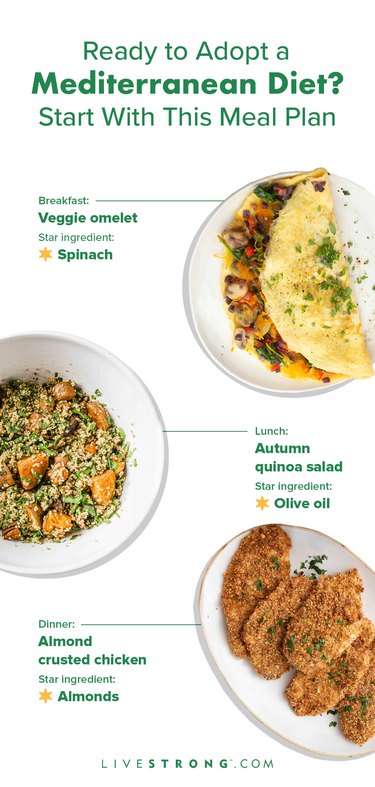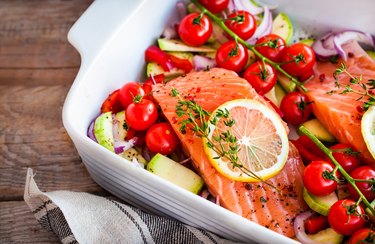

The Mediterranean diet is more than a meal plan, it's a lifestyle — at least, that's the opinion of registered dietitian Stefanie Dove, RD, who enthusiastically recommends it as a smart and healthful way to go about choosing the food you eat.
Here's what to know about this much-lauded eating plan — it was named the Best Diet of 2023 for the sixth year in a row by the U.S. News & World Report — plus an easy and tasty weeklong meal plan to get you started.
Video of the Day
Video of the Day
What Is the Mediterranean Diet All About?
Simply put, the Mediterranean diet relies on the long-lasting overall eating habits of people who live in countries that border the Mediterranean Sea, according to the American Heart Association (AHA).
The plan favors whole grains, fruits, vegetables, seafood, legumes (beans, peas and lentils) and healthy fats, plus a moderate amount of wine and shuns red meat, trans fats, items with added sugar and processed foods such as refined grains and oils.
Sounds sustainable, right?
Indeed, people on the Mediterranean diet were able to follow it more closely and stick with it for a year than those trying intermittent fasting and paleo, per December 2019 research in The American Journal of Clinical Nutrition.
"The Mediterranean diet does not eliminate food groups, which is important. All food groups are vital for health and wellness."
"These are general guidelines for overall good health, so as a dietitian, I always favor those plans that promote balance," Dove tells LIVESTRONG.com. "The Mediterranean diet does not eliminate food groups, which is important. All food groups are vital for health and wellness."
The Benefits of the Mediterranean Diet
Although this style of eating could be higher in overall fat than a nutritious diet promoted by the AHA, people who follow a Mediterranean diet actually eat less saturated fat than those who adhere to the average American diet.
Plus, both heart disease and death rates are lower in Mediterranean countries than in the U.S., although that could be attributed to other lifestyle factors, such as physical activity, per the AHA.
The heart health benefits of the Mediterranean diet have been widely researched and that's what this eating plan is most praised for.
A significant study of more than 7,400 people found that sticking to a Mediterranean diet that included olive oil or nuts is linked to a reduced risk for heart attack, stroke and heart-related death by about 30 percent compared to a low-fat diet, per April 2013 research in The New England Journal of Medicine.
Although there were flaws in the initial analysis of the study, a second examination of the results in 2018 confirmed these findings, according to the American College of Cardiology.
And an April 2020 meta-analysis in The BMJ that reviewed 121 randomized trials found that the Med diet was the only diet that continued to improve cardiovascular risk factors (i.e. blood pressure and cholesterol) in the long term (past 12 months). It also found that the diet was effective for weight loss.
That's not all: The Med diet was associated with a lower risk of cognitive impairment in an April 2020 study in Alzheimer's and Dementia that looked at 8,000 participants with and without age-related macular degeneration. However, the cognitive function results weren't as significant: These potential effects were observed at the population level, so individual people likely won't notice a difference in cognitive function.
What's more, the Med diet is rich in omega-3 fatty acids, found in fatty fish and some seeds such as chia and flax. Supplementing with omega-3s or eating more fatty fish is tied to lower triglycerides and larger HDL cholesterol particles, which are better at removing unhealthy LDL cholesterol and potentially preventing plaque buildup and heart disease, according to a February 2020 study of 26,034 people in JAHA.
Mediterranean Diet Food List

Healthy fats and plant-based foods are the cornerstones of the Mediterranean diet, which also emphasizes eating seafood regularly and poultry, eggs and dairy in moderation.
Key foods for a Mediterranean meal plan, according to the University of Wisconsin, include the following.
Foods to Eat a Lot Of
- Vegetables: Leafy greens, broccoli, cauliflower, zucchini, carrots, mushrooms, asparagus and more, as well as starchy vegetables such as potatoes and sweet potatoes
- Fruits: Berries, apples, bananas, citrus, pears and more
- Fats: Olive oil, avocado, olives, nuts and nut butter, seeds
- Whole grains: Whole-wheat pasta, brown rice, quinoa, farro, barley, bulgur, whole-grain bread, oatmeal
- Legumes: Beans (such as garbanzo, white, black and kidney), peas and lentils
- Seafood: Fish — especially fatty varieties such as salmon and herring — as well as shrimp, clams, oysters, crabs and more
- Herbs and spices
- Water: H2O should make up the lion's share of the beverages you choose on a Mediterranean meal plan.
- Coffee and tea: Just try to avoid using sugar to sweeten your beverages.
Foods to Eat in Moderation
- Eggs
- Poultry: Chicken, duck and turkey
- Dairy: Greek yogurt, kefir, cheese and milk
- Wine: Unlike a number of other eating plans, the Mediterranean diet not only allows but encourages a moderate amount of wine, particularly red wine. But enjoying wine is completely optional. People assigned female at birth should limit their alcohol to one glass a day, which is about 5 ounces, while people assigned male at birth can have up to two glasses per day.
Foods to Avoid
The Mediterranean diet doesn't eliminate any particular food group, but it does discourage eating certain foods.
For example, red meat such as beef and pork, should be rarely eaten on a Mediterranean meal plan, while processed meats such as sausage, bacon and hot dogs should be avoided entirely.
Other ingredients to limit or avoid, according to the Cleveland Clinic, include:
- Foods with added sugars: Soda, candy, ice cream and more
- Foods with trans fats: Margarine and commercial baked goods
- Foods made with refined grains: White bread, white rice, white pasta, and more
- Refined oils: Soybean oil, canola oil and more
How to Meal Plan for the Mediterranean Diet
Making a meal plan can be overwhelming to a beginner, particularly if you're getting started on a new eating plan such as the Mediterranean diet.
To simplify the process, pick a few recipes that contain fewer than 10 ingredients, Diana Gariglio-Clelland, RD, of Balance One Supplements, tells LIVESTRONG.com.
"The diet emphasizes fresh fruits and vegetables, so eating those items in season will allow consumers to save money at the checkout counter."
"A Pinterest search or just Googling 'easy Mediterranean meals' is the way I do it personally," she says. Or check out some of our recipes below!
Gariglio-Clelland also recommends picking recipes that use the same main ingredient, like focusing on salmon or shrimp recipes during a one-week period, noting that this method saves money because it reduces waste and time spent shopping for several ingredients.
At first glance, a Mediterranean meal plan might seem like it's a budget-buster, but that couldn't be further from the truth, Dove notes.
"The diet emphasizes fresh fruits and vegetables, so eating those items in season will allow consumers to save money at the checkout counter," she says. "Eating seasonally also encourages you to try new fruits and vegetables they otherwise would have never considered."
Dove recommends using beans and eggs as inexpensive protein sources, as well as buying beans, whole grains and nuts in bulk. "Fish and lean proteins will often be the most expensive items," she admits. But stocking up when the proteins are on sale at your local supermarket and freezing for later is always an option.
Plus, choosing frozen or canned fish or venturing to the nearest wholesale club to purchase bulk packs and individually freezing them can help you save some cash on the proteins, too. "Whether frozen or fresh, both still pack the nutritional punch you need," she says.
Your 7-Day Mediterranean Meal Plan
Sunday
- Breakfast: This Crispy Feta Fried Egg is wonderfully textured and can be amped up with a sprinkling of your favorite herbs; we like parsley or dill.
- Lunch: Ditch the meat for these 307-calorie Black Bean Veggie Burgers that satisfy.
- Dinner: Round out your day with a totally Greek-inspired Sheet Pan Tzatziki Chicken paired alongside this Avocado Cucumber Tomato Salad With Balsamic Vinaigrette.
- Snack/Dessert: Make a batch of this Frozen Yogurt Bark to enjoy all week long.
Monday
- Breakfast: These Scrambled Eggs With Cottage Cheese are packed with 17 grams of satiating protein.
- Lunch: Mediterranean Salad Skewers make for a wonderfully versatile lunch or brunch.
- Dinner: Use whatever veggies you have on hand for this beyond-quick Roasted Shrimp With Veggie Couscous dinner.
Tuesday
- Breakfast: Enjoy this quick-to-make Berry Quinoa Porridge with some extra berries for even more fiber
- Lunch: Mediterranean-diet-approved veggies and beans are abundant in the Creamy Vegetable Soup, which you might consider eating with a Traditional Greek Salad.
- Dinner: Add some shrimp, chicken or extra veggies to this already protein-packed Tomato Cottage Cheese Pasta.
Wednesday
- Breakfast: Swap eggs for soybeans in this protein-packed Tofu Scramble.
- Lunch: An innovative way to enjoy canned tuna, these Tuna Balls Salad Bowls will likely become a new lunch staple. Feel free to add some avocado slices to up the texture and heart-healthy fat.
- Dinner: Devour this Almond Crusted Chicken alongside a delicious Superfood Spinach Quinoa Salad With Pomegranate Citrus Dressing.
Thursday
- Breakfast: Add flaxseeds — a great source of plant-based omega-3s — to these customizable Scrambled Oats, which are packed with protein, thanks to the egg and Greek yogurt
- Lunch: This Honey Lemon Skillet Salmon is easy to put together and pairs wonderfully with a side of veggies; might we suggest these Greek Vegetables?
- Dinner: The Tuna Pesto Pasta Salad is made with a melange of pantry staples — think canned fish, beans and veggies with bulk grains — proving healthy dinner doesn't need to be complicated (or expensive).
Friday
- Breakfast: Take care of those about-to-go vegetables lingering in your crisper with this very adaptable Veggie Omelet.
- Lunch: Fiber-rich grains add crunch to the Autumn Quinoa Salad With Sweet Potatoes, which boasts less than 400 calories.
- Dinner: These Chicken Parmesan Zucchini Boats pack in the terrific flavor of the classic Italian dish, but smartly cuts the carbs.
Saturday
- Breakfast: Start your weekend these Greek Yogurt Pancakes; top with berries for the perfect dose of sweetness.
- Lunch: This Loaded Vegetable Egg Bake feeds a crowd, yes, but it also holds up well in the fridge, meaning a healthy bite of protein will be available to you whenever hunger strikes.
- Dinner: Pair Pan Seared Halibut with this Tortellini Caprese Salad for extra muscle-building protein.

- Mayo Clinic: "Mediterranean Diet for Heart Health"
- The New England Journal of Medicine: "Primary Prevention of Cardiovascular Disease with a Mediterranean Diet"
- American Heart Association: "Mediterranean Diet"
- American College of Cardiology: "Study Confirms the Heart-Health Benefits of a Mediterranean Diet"
- UW Health: "Mediterranean Food Guide"
- Cleveland Clinic: "Mediterranean Diet"
- The American Journal of Clinical Nutrition: "Intermittent fasting, Paleolithic, or Mediterranean diets in the real world: exploratory secondary analyses of a weight-loss trial that included choice of diet and exercise"
- The BMJ: "Comparison of dietary macronutrient patterns of 14 popular named dietary programmes for weight and cardiovascular risk factor reduction in adults: systematic review and network meta-analysis of randomised trials"
- Alzheimer's and Dementia: "Adherence to a Mediterranean diet and cognitive function in the Age‐Related Eye Disease Studies 1 & 2"
- JAHA: "Habitual Fish Consumption, n‐3 Fatty Acids, and Nuclear Magnetic Resonance Lipoprotein Subfractions in Women"
- U.S. News & World Report: "Best Diets 2021"
Is this an emergency? If you are experiencing serious medical symptoms, please see the National Library of Medicine’s list of signs you need emergency medical attention or call 911.